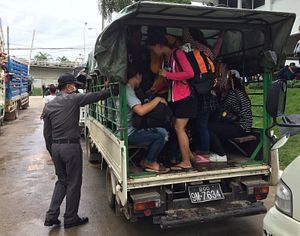Migrant workers from Laos, Cambodia, and Myanmar are the backbone of the Thai economy. As of May 7, 2018 there were 2,189,868 registered migrants in Thailand, yet there are many more undocumented laborers. They have long been the solution to the problem of rising domestic labor costs, amid the need for large amounts of manpower. Often unseen, many operate among the fringes of Thai society.
In the city of Mae Sot in western Thailand, bordering Myawaddy, the overwhelming majority of migrants are from Myanmar. Yet due to a law passed 12 months ago, and its subsequent and recent amendment, their future in Thailand is becoming increasingly precarious.
The Royal Ordinance on Foreign Worker Management was officially implemented on June 23, 2017, only for the implementation to be delayed for a 180-day grace period, following considerable panic over whether migrant workers could get registered in time. Despite this grace period, between June 29 and November 27, 150,000 migrant workers returned to Myanmar to escape huge fines and imprisonment. This ordinance was criticized for being poorly designed and implemented, and having overly harsh punishments for migrants who didn’t have proper documentation.
Two months ago, this Royal Ordinance was amended in line with comments from civil society, migrants and policy advisors. On March 23, the Royal Ordinance of Foreign Worker Management No. 2 came into effect and brought with it a lot of changes. The previously high penalty against employers who employed illegal migrants was reduced from 400,000-800,000 baht ($12,500 to $25,000) per person to between 10,000-100,000 baht. Most importantly, under Section 101 the punishment for migrant workers caught working without a work permit has been adjusted from five years imprisonment and a 20,000-100,000 baht fine to a 5,000-50,000 baht fine without imprisonment.
According to Aung Aung, a member of the Migrant Rights Promotion Working Group, “The Royal Ordinance was very worrying at first, but it has now improved after the amendments. A lot of the punishments have been toned down, and sections of the law revised, but things are still far from perfect.
“The government implemented this law, to support the MOU procedure,” according to Busayapa Srisompong, a lawyer and advocate for migrant rights, “and to ensure migrants have proper documentation and visas. However this costs more than other types of documentation and often the employer would rather use a cheaper alternative to save money.”
Following last year’s Royal Ordinance, new alternatives were used for migrant documentation to sidestep the MOU procedure, now strictly enforced. As a result, now many migrants are working in Thailand under a law designed to facilitate seasonable workers. What has become commonplace, according to Busayapa, is that “the factory owner hires workers under a seasonal permit and will continually renew the permit, instead of properly registering their employers. This leaves all the risk with the migrant laborer. If employers used the MOU system, they would have proper social security.”
Under section 64 of the Royal Ordinance on Foreign Worker Management, seasonal worker permits are available. These are designed for short term labor, up to 30 days, and meant for those living in Myawaddy and border areas. Currently over 21,000 migrant workers have entered Thailand under section 64. This is cheaper, faster, and entails less responsibilities for the factory but confers little legal status or social protection on the migrants.
Under section 64 it is harder for migrants to receive access to compensation for work-related injuries, due to the temporary nature of the work. Some migrants under this section also struggle to receive the 310 baht minimum wage in Thailand. Moreover, according to Busayapa, agencies continue to take advantage of migrant workers for their own profit: “Under section 64, the seasonal worker pass is only for Myawaddy residents but almost all laborers that come through under section 64 are not from Myawaddy. Agencies are used to provide required documents of proof of house registration in Myawaddy, all at a high cost to migrants. They are being exploited.”
Following the law, numerous manpower and employment agencies sprung up to help organize visas, permits, and paperwork for migrant workers, such as the house registration Busayapa mentioned. However many of these agencies do not have the best interests of migrant workers at heart and instead are ruthless in their exploitation of this lucrative cash-for-permit trade. Misinformation is rife, and the most valuable currency of agencies. The process, while being simplified, is still complex and confusing, and this confusion plays into the hand of the agencies. Around the CI office in Mae Sot, agencies, photocopiers, and fixers operate for high prices, preying on the uninformed.
While now, 12 months on, the law is much better for migrants than it threatened to be, further amendments to the law are necessary. Most of all section 64 needs to be redrawn in light of the exploitation of its loopholes. Further there needs to be a crackdown upon exploitative labor agencies; they operate in gaps of information and climates of fear. That the major beneficiary from these changes in the law are the agencies themselves, not the workers the law was put in place to benefit, highlights deficiencies within the law. If more legal documents were available in Burmese, and the legal system was clear and accountable, there would not be the same need for such agencies.
Life on the Thai side of the border is hard, expensive and risky. Yet due to the economic and political situation and economic situations in Myanmar, Laos, and Cambodia, Thailand will long remain an attractive destination for migrants, with or without adequate legal reform. If this is the case, migrant workers will continue to pay the price for the existence of loopholes, such as section 64, within the Thai legal system.
Maximillian Morch is a freelance journalist and researcher. Follow him on Twitter: @max_morch

































